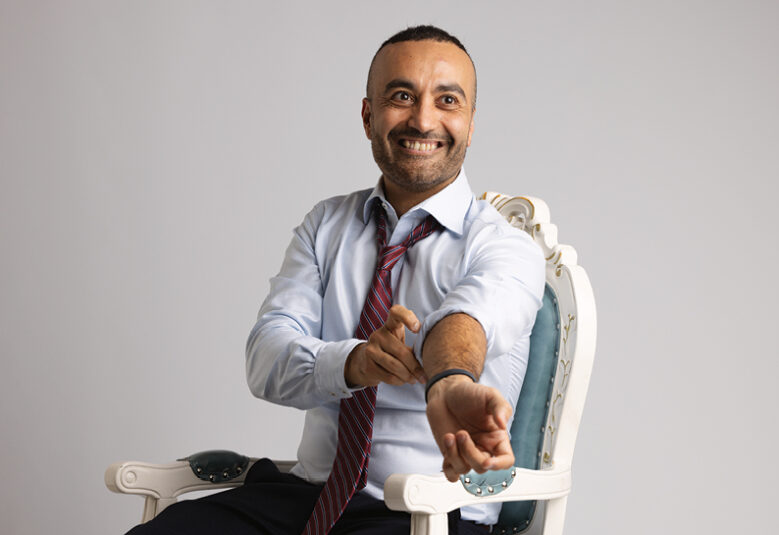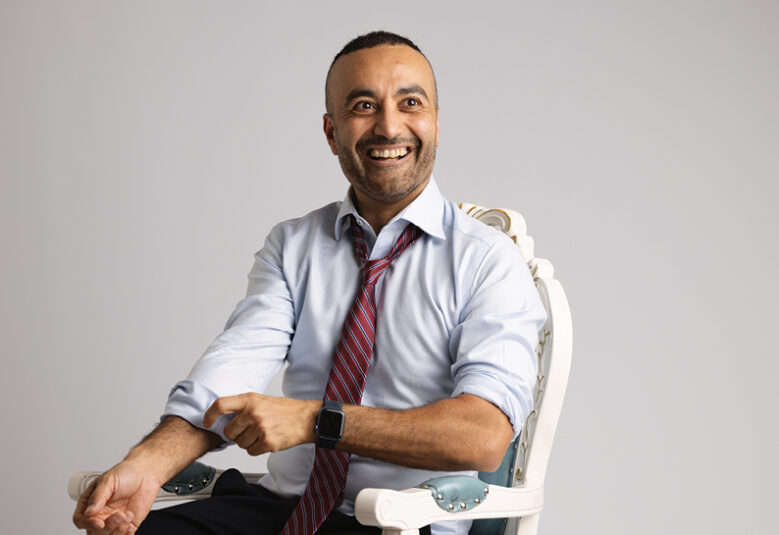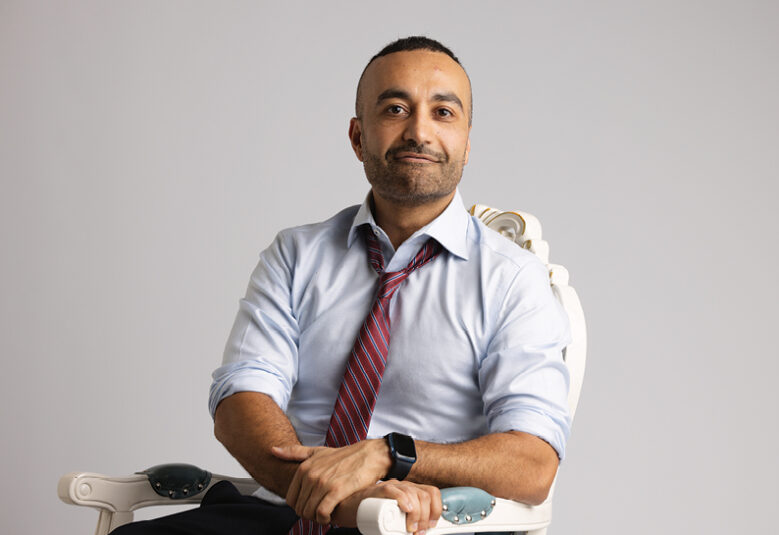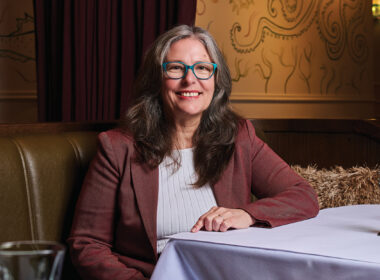The work of the HIV/AIDS Legal Centre isn’t just fighting legal battles; they’re fighting for dignity, equality, and a future free from HIV discrimination.
The first days of January had barely begun, and a warm, overcast Friday morning found me in the lobby of ACON Sydney, nestled in the vibrant suburb of Surry Hills. As I took in the colourful décor, my eyes were drawn to the posters lining the walls, each a testament to the diverse range of support services offered – community health, inclusion programs, and HIV responses for people of all sexualities and genders. Among these vital services was the HIV/AIDS Legal Centre (HALC), where I was about to meet its principal solicitor, Vikas Parwani.
Arriving with the punctuality of a job interviewee (and perhaps a touch too early), I was soon greeted by Vikas himself. We exchanged pleasantries, sharing stories of the recent holiday season. Fresh from a Christmas break spent reconnecting with family in Pakistan, he seemed eager to dive back into the work that has become his life’s passion and purpose.
There’s something about him that just makes you feel comfortable. He’s got this genuine, down-to-earth way about him that instantly puts you at ease. And the conversation flows naturally, like you’ve known him for years. It makes sense that he’s found his niche and is thriving in it – he’s clearly got a knack for connecting with people.
We head upstairs to the HALC office, where Parwani enthusiastically shows me around. However, it’s the first week of January, and the office is quiet. The only sound is the gentle hum of the air conditioning, a stark contrast to the city’s bustling energy just outside the windows. “People are still trickling in after the holidays,” he explains, gesturing towards the mostly empty desks. But the work at HALC never stops.
After we tour the modest office space, we settle into a meeting room, where he shares his story. The window behind him framed a view of the iconic Surry Hills pub, The Strawberry, and the constant movement of Central Station, a reminder of the vibrant life just outside HALC’s doors. He speaks with a quiet passion, his eyes lighting up as he discusses the Centre’s mission to support those often forgotten and marginalised – people living with HIV, facing legal battles and societal stigma.
HALC, founded in 1992 through the merging of the ACON Legal Working Group and the AFAO Legal Project, is the only organisation of its kind in Australia. Its existence is a testament to the ongoing need for specialised legal support for people with HIV, navigating complex issues of discrimination, immigration, and access to healthcare. However, Parwani’s journey to this role spanned continents and took unexpected turns, beginning 11,000 kilometres away in a world where Australia seemed an unlikely destination.
“Australia’s response to HIV has been world leading in all senses, with NSW aiming to virtually eliminate new transmissions by 2030. But what’s holding it back is these new laws that are coming into place.”
Beginnings
“I grew up in Karachi, Pakistan,” Parwani began, “the youngest of three boys.” His father, a businessman with agricultural holdings hours outside the city, provided a comfortable life, though Parwani chuckled, “Dad mainly directed his managers who worked the land, [but] didn’t really do any of the farming.”
He describes his childhood as “privileged but fairly average.” Born and raised in the bustling coastal city of Karachi, he was the first in his immediate family to experience urban life from the very beginning. In contrast, his older brothers were born and raised in a rural town a few hours away. He thrived in the structured environment of the British education system, eventually becoming the first in his family to complete higher education at university.
Reflecting on his younger years, he explains that while Karachi may have lacked many activities, he found joy in sports. His family’s membership to a local sports club opened doors to swimming, tennis, squash, and badminton. He even played competitive snooker until age 14, when he “randomly lost interest” and shifted his focus to tennis – a passion that continues today.
“I always wanted to go to law school from a pretty young age,” he shares with a hint of that childhood determination still in his voice. “It started with TV shows like L.A. Law.” For Parwani, the courtroom drama and the idea of fighting for the little guy against big corporations all seemed so exciting. He was drawn to the idea of using the law as a tool for justice, for empowering those who had been wronged.
The reality, of course, proved far more complex than the idealised world of legal dramas. “I know now that not everyone has access to justice,” he admitted, a touch of disillusionment colouring his words. “[E]quality under the law is a bit of a myth in a lot of ways.” But the core of that early passion, the desire to make a difference, remained, and it was from these fictional legal worlds that the foundation for his tertiary education pursuits was laid.
Pakistan, while offering good universities, had limited options for specialised fields like law, prompting Parwani to look abroad for his higher education. The US and Canada, with their prestigious universities, were the natural choices. Australia, at that time, wasn’t even a consideration.
“It’s just not where people I knew went,” he explained. In his circles, Ivy League universities were the goal, and the dream.
At 19 years old and with the world at his feet, he enrolled at McGill University in Montreal, Canada, pursuing an Arts degree as a prerequisite for law school. Montreal, he recounted, was an incredible city, a melting pot of cultures and experiences. He embraced the Canadian lifestyle, but the long, harsh winters and the relentless pressure of academia gradually wore him down.
“By the end of it, I was exhausted,” he confessed. “I didn’t love what I was studying.” To add to that, the constant snow and the minus 30-degree weather took a physical toll on him. He knew he couldn’t envision building a life in that environment.
He admits that the only legal subject that truly captured his interest was Competition Law. Despite his initial enthusiasm, he struggled with the subject, ultimately performing “pretty poorly.”
On reflection, Parwani tells the Journal, “I didn’t necessarily do bad because I didn’t understand the subject. I think it was just the way that it was structured … they wanted a theoretical essay on it, as opposed to having a legal problem and having someone analyse and assess it … I learned that I’m better at that one thing versus the essay and the theory part of it.”
But at this point in his life, it was a disappointing experience that forced him to re-evaluate his aspirations for a career in law.
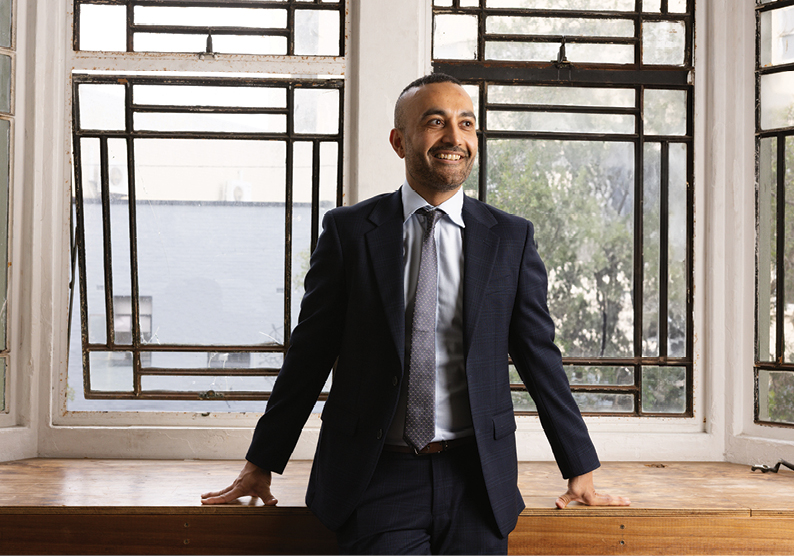
The detour
In 2005, with the Pakistani economy experiencing a boom, Parwani returned home, seeking new opportunities. He landed a coveted position at Citibank, one of only nine candidates selected from a pool of 4,000 applicants for their graduate program. He was eventually placed in the credit policies department, assessing risk for consumer banks. It was a stable job where he would stay for two years, but it wasn’t his passion.
A pivotal moment came during a visit back to Canada. He reconnected with a close friend, a passionate advocate for human rights and social justice, who was shocked to learn about him working at a bank.
“What happened to law school and changing the world, one case at a time?” she challenged him. Her words struck a chord. Parwani had no answer, only a growing sense of unease.
“Let’s get back on course,” he told himself at the time, “That was never what you want(ed) to do. You’ve had your two-year break after undergrad, it’s time to find where you want to go.”
Upon returning to Pakistan, he quit his job at Citibank and enrolled in a law correspondence course through the University of London. As he delved back into legal studies, his old passion rekindled. He realised that he not only enjoyed the law but also excelled at it.
With renewed determination, he set his sights on law school. The US, with its increasingly stringent immigration policies and Parwani’s own negative experiences with discrimination after 9/11, was no longer an option. Canada, with its harsh winters, held little appeal. The choice came down to the UK and Australia, both with common law systems.
Australia, with its coastal climate similar to Karachi and a reputation for welcoming immigrants, ultimately won out.
“I grew up going to the beach every Sunday … at least into my teens and after … it just sort of made sense,” Parwani says.
“It was the work that most mimicked what I’d imagined, in a sense, my life would look like when I was younger.”
He applied to several universities and was thrilled to be accepted into UNSW’s inaugural Juris Doctor program.
He says that from day one, it felt right, with a broad smile spreading across his face. Explaining that UNSW was progressive, focused on human rights, with a vibrant intellectual atmosphere, allowing him to thrive.
“It’s a law school that aligns with my values … I enjoyed having those conversations and having peers who were like-minded around me.”
“I think 10 to 20 per cent of your mark was class participation, and you had to participate. And I remember in four years of my undergrad degree, I don’t remember putting my hand up to speak on any topic. But at law school, you couldn’t get me to shut up,” he recalls with a laugh.
He immersed himself in his studies, completing his JD in two years thanks to exemptions from previous coursework. A clinical placement at the Kingsford Legal Centre exposed him to the harsh realities of family violence in Australia, further solidifying his commitment to social justice.
During his studies, the university offered a class on alternative careers, which is where he first learnt about Community Legal Centres (CLCs), organisations dedicated to providing legal assistance to marginalised communities. “Everyone was applying for clerkships to big law firms,” but as he learnt, there were other options. “You don’t have to just be doing that. You can do this.”
His time in Canada and frequent trips to the US in the months after 9/11 had left him with a deep understanding of discrimination. “[I]t was just a lot of this extra bureaucracy that you had to go through if you were from a certain country and looked a certain way and were a certain age,” he recounted. He was determined to use his legal skills to combat prejudice and fight for equality.
Arriving in Australia as an international student, Parwani was acutely aware of the complexities of the visa process. During his first week at the College of Law, while searching for practical legal training (PLT) placements, he stumbled upon a HALC volunteer ad. He had seen HALC at the Mardi Gras parade, and their message of support resonated with him.
It felt like fate. He applied immediately and started volunteering the following week.
He dedicated three to four days a week to HALC, finding the work both challenging and incredibly rewarding. It was the closest he had come to fulfilling that childhood dream.
“It was the work that most mimicked what I’d imagined, in a sense, my life would look like when I was younger,” he reflects. Helping vulnerable clients, fighting for justice – it was exhilarating for him.
He thrived in the supportive environment at HALC, learning from experienced lawyers and advocates. He honed his legal skills, working on a variety of cases, from discrimination complaints to immigration appeals. He developed a deep understanding of the challenges faced by people living with HIV, particularly the stigma and discrimination they often encounter.
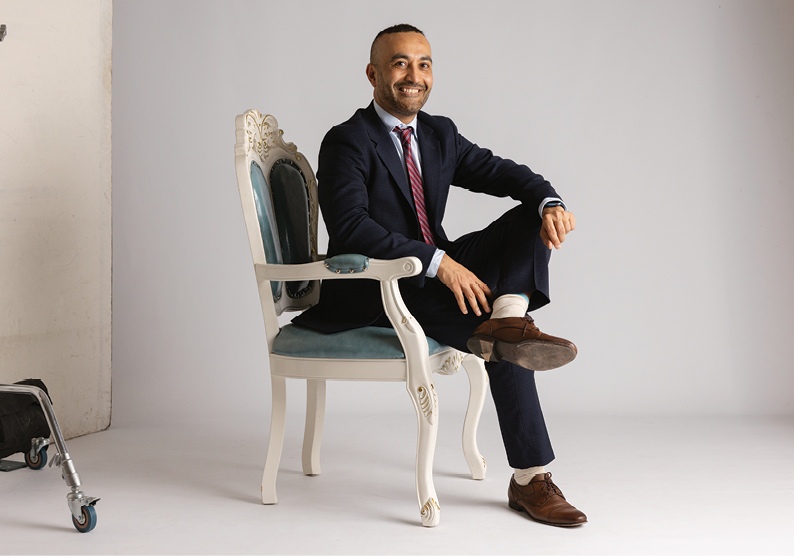
After completing his PLT and being admitted as a solicitor, an opportunity arose to work on Manus Island, providing legal assistance to asylum seekers detained under Australia’s controversial offshore processing regime. The conditions were harsh, the work emotionally draining, but Parwani felt compelled to help.
“It was a confronting experience,” he admitted. The heat, the cramped living conditions, and the sheer desperation of the people he was helping took a toll.
His living quarters were a room on a large ship called “The Bibby Progress” crammed with bunk beds. To make matters worse, during his deployment, the air conditioning on this vessel wasn’t working. While fans offered a slight relief, sleep was a luxury he rarely enjoyed.
Adding to the challenges, he was deployed as part of a transitional team, not the usual crew. This meant that most of the team members were unfamiliar with each other, creating a less cohesive environment in an already difficult situation. And while rumours of delicious meals on the ship had reached him, the reality was quite different. By the time he arrived, the food situation had deteriorated significantly, leaving him with limited and unappetising options.
His “office” was a stiflingly small room, which he describes as a “shoebox” – where he would spend the majority of his days. The pressure was immense: he had just two hours with each asylum seeker, aided by an interpreter, to complete their entire application and draft a comprehensive statement outlining their claims. He had to churn out three of these complex cases a day. To cope with this overwhelming workload, their days would begin at the crack of dawn, 6 or 7 am, and stretch into gruelling 12 to 14-hour marathons. The interpreter’s limited availability only added to the time crunch.
He draws a stark contrast between the time he’d typically dedicate to a protection application back home – a day and a half to two days to craft a thorough statement – and the pressure-cooker environment he faced in Papua New Guinea.
“The forms themselves are incredibly lengthy and demand a huge amount of information,” he explains. “Then you have to have it all read back to the client with an interpreter, ensuring you understand their instructions perfectly, and making sure it’s all done competently. But having to complete three of these in a single day, within two hours … that gets you pretty skilled in that role.”
After three weeks in those difficult conditions, he returned to Australia with a strong reluctance to return. He settled into juggling a paralegal position at Corrs Chambers Westgarth with his ongoing volunteer work at HALC. However, a sense of duty and deep empathy for the asylum seekers compelled him to do more.
Thankfully, his subsequent deployments were a marked improvement. “We had actual offices that weren’t the size of shoeboxes,” he recalls, highlighting the better living and working conditions. He was also profoundly inspired by his colleagues. “It was a team of very young, passionate human rights lawyers,” he explains. “Everyone was driven by the desire to do their absolute best for these people and present the strongest possible claims.”
This shared dedication, despite the initial hardships, led to remarkable success. An impressive 70-80 per cent of the claims processed on Manus Island and Nauru were found to have protection obligations.
He would complete six more deployments to Manus Island over a year, three weeks on and three weeks off, witnessing first-hand the human cost of Australia’s immigration policies. “There was a lot we saw that just felt wrong in a lot of ways,” says Parwani, his voice heavy with emotion. “The government’s policy at the time … it’s well reported as to how cruel it was found to be … United Nations organisations discussed how it breached various obligations that we had.”
Despite his dedication to both his work in Australia and his deployments to Manus Island, his frequent absences created an unexpected hurdle: all the time spent outside the country meant he wasn’t fulfilling the residency requirements needed to apply for Australian citizenship.
“At some point, I should do this,” he recalls thinking, “I can’t just keep going to Papua New Guinea, right?”
Parwani needed to find a stable job. A friend and former colleague encouraged him to apply for a job at a small law firm where they were working, specialising in financial services. Despite his initial reservations during the interview, he was persuaded to accept the six-month contract. The work involved contract reviews, advising financial service providers, and – the part he found most challenging – licensing for financial planners. When his contract came to an end, it wasn’t renewed which Parwani says was for the best.
As luck would have it, at the same time he left his job, Indraveer Chatterjee, HALC’s principal solicitor was transitioning to the bar, and Alexandra Stratigos, a colleague he’d worked with on a couple of deployments to Manus Island, was slated to take over the role alongside Melissa Woodroffe, creating a job opening. Just as he was about to embark on his final deployment to Manus Island, he received a call from Chatterjee. He informed him of the new role and offered to recommend him for the position if he was interested. Of course, Parwani didn’t hesitate; it was where he felt he belonged, after all. “I think someone asked me at the time, if you had to pick a job, what would you be doing?” to which he replied, “I’d like to work at HALC, I really enjoyed it”.
“While I was on Manus Island,” he recalls, “I got a text from Alex simply saying, ‘Do you want the job?’ And that was it.”
He returned to Australia and joined HALC full-time as Solicitor in April 2016, where he has been making a difference ever since. Fast forward to 2024 when HALC’s Principal Solicitor announced her departure, Parwani was the natural choice to fill the position.
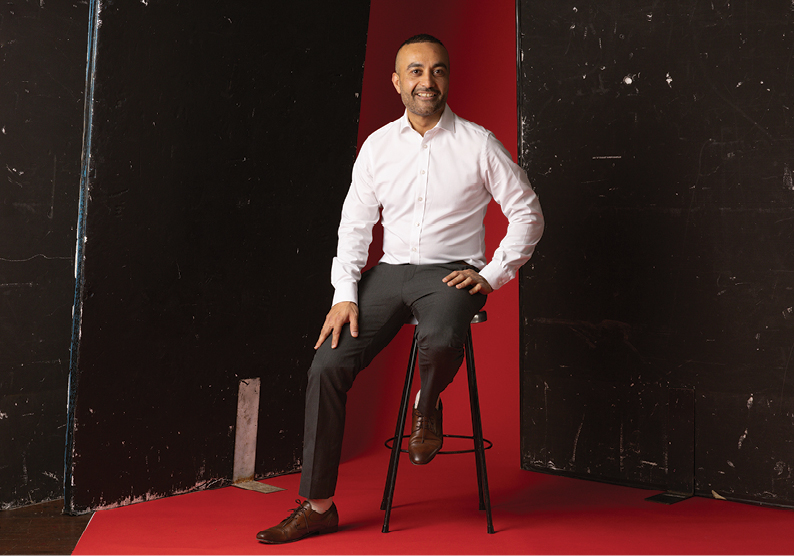
Leading the charge
Parwani leads a small but dedicated team at HALC, committed to creating an inclusive environment for Australians living with HIV, free from discrimination and ensuring equal treatment under the law and in everyday life. They are also working towards expanding their services to people with Hepatitis, although funding currently limits this work.
He details the challenges faced by people with HIV, starting with immigration. Australia’s health criteria for visas often discriminate, requiring applicants with HIV to prove their condition won’t impose an “undue cost” on the community. This involves a complex system of waivers and appeals, where HALC provides vital legal assistance and advocacy. Even more challenging is representing asylum seekers fleeing persecution in their home countries due to their HIV status or membership in key populations like LGBTQ+ individuals, sex workers, or drug users.
“If you’re HIV positive, you can’t meet the health criteria for most permanent visas,” Parwani says.
He expresses frustration with outdated HIV policies, particularly in the insurance sector. People with HIV often face denials or exorbitant premiums based on outdated actuarial data, frequently sourced from other countries. HALC challenges these discriminatory practices by filing complaints and advocating for law reform. “Insurers are using outdated data that doesn’t reflect the reality of HIV in Australia today,” he explains, highlighting the significant advancements in treatment. Effective treatment can lead to an “undetectable viral load,” meaning zero risk of transmission, and patients can go on to live long, healthy lives.
“HIV treatment and medications are very advanced now. A person living with HIV can have a normal life expectancy,” Parwani says.
While HALC regularly files discrimination complaints, these cases are typically settled before reaching trial. To prepare for potential litigation, they commissioned a UNSW actuarial report to gather existing data on HIV and its impact on insurance.
Employment discrimination is another area of concern, where people with HIV face unfair dismissals or are denied opportunities. HALC provides legal representation, fighting for their right to work. Parwani stresses the importance of strategic litigation, citing Zaburoni v The Queen, where HALC’s advocacy helped clarify the legal definition of intention in HIV transmission.
However, despite HALC’s work, Parwani reveals that significant progress in eliminating HIV discrimination remains elusive. “We’ve educated people on disclosure requirements, so they just don’t disclose,” he explains. “But when they do disclose, there is discrimination, and there’s ample evidence of it.” He emphasises that stigma remains a significant barrier to testing and treatment, preventing people from seeking help and disclosing their status. HALC combats this through community education and awareness campaigns, working to create a society where people with HIV are treated with dignity and respect. “HIV transmission usually occurs when people aren’t getting tested or treated,” he concludes, “and this stems from stigma.”
He argues that current laws and policies also discourage testing. Knowing one’s status creates legal liability for disclosure, opening individuals to discrimination. “Laws that criminalise HIV transmission and require disclosure are contrary to achieving the best public health outcomes,” he says, citing international studies.
He laments the regression in Australia’s legal landscape. For example, the Mandatory Testing Act 2021, which was strongly opposed by the community and dubbed the “spitting legislation”, calls for mandatory HIV testing (among other conditions) for individuals whose bodily fluids (including saliva) come into contact with health, emergency, or public sector workers.
“[T]hat’s not how HIV is transmitted,” Parwani says, adding that laws like these are problematic and perpetuate outdated views about HIV transmission.
Similar laws equate non-disclosure of HIV status before sex with a lack of consent, potentially leading to sexual assault charges. Since June 2022, NSW has required affirmative consent for sexual activity. Then-Attorney General Mark Speakman suggested that falsely claiming to be free of infection or disease, when influencing consent, may be considered fraudulent inducement negating consent, depending on context and intent. Therefore, misrepresenting one’s HIV status could be construed as fraud under this updated law.
“The generosity of these people who come from such intimidating and traumatising situations is inspiring, it’s what motivates us every day, certainly me.”
While HALC recognises the importance of the law to protect against some forms of ‘fraudulent inducement’, their concern is that this broad provision will negatively impact public health, particularly people living with HIV (PLHIV) including their privacy and safety. They continue to advocate for law reform to ensure misrepresentation of HIV status does not constitute fraudulent inducement or negate consent, and protecting PLHIV in NSW. Parwani refers to those with an undetectable viral load, “If you can’t transmit the virus, why is disclosure mandatory? Should you disclose having cancer or a cold?” he asks. He notes that other countries are moving away from such laws while Australia seems to be embracing them. He acknowledged Australia’s leading role in HIV response, with NSW aiming to virtually eliminate new transmissions by 2030. “But what’s holding it back is these new laws that are coming into place,” he warns.
HALC, like other Community Legal Centres in Australia, is primarily funded by federal and state governments through the National Access to Justice Partnership. This funding supports HALC’s core service of representing people with HIV-related legal issues in NSW. However, to address the needs of clients outside NSW, HALC has partnered with a consortium of organisations called Health + Law to access Commonwealth study grants. Despite these efforts, funding remains a challenge.
Parwani acknowledges their limited resources, particularly their inability to provide national coverage. “We have to turn away people from interstate,” he concedes regretfully. “The need is there, but we simply don’t have the capacity.” He remains committed to expanding HALC’s reach, believing everyone living with HIV in Australia deserves access to quality legal services, regardless of location.
HALC also faces staff retention challenges, exacerbated by the cost-of-living crisis. They rely on recruiting from their pool of PLT volunteers, a system they value. While acknowledging the importance of volunteers, Parwani expresses gratitude, stating that recruiting from this pool is what they’ve always done well “…[we’ve] had good success with it … you have some amazing young people working here who are doing some great work.”
Motivation
Despite the difficulties, he remains optimistic, inspired by the resilience and generosity of HALC’s clients. He shares stories of their successes, like the Indonesian man who, after receiving a permanent visa with HALC’s help, achieved his dream of becoming a bus driver. “Those moments make it all worthwhile,” he says. “Seeing the impact we have is incredibly rewarding.”
He speaks of the generosity of clients who, despite immense hardship, find ways to give back. He recalls a client who was working in hospitality, and upon receiving his protection visa, donated his entire tip money that he had been saving – $800 – to HALC. “The generosity of these people who come from such intimidating and traumatising situations is inspiring,” Parwani says. “It’s what motivates us every day, certainly me.”
Parwani encourages all lawyers to engage in pro bono work as much as possible, assisting Community Legal Centres in various ways, from developing publications to providing spaces for community legal education. “We’ve got all these massive firms with a lot of resources who do help,” he says, “but I think we could probably use a bit more of the help in the absence of an increase to government funding so that we can deliver services.” He adds, “It would also be good for us to have more lawyers educated about STIs and HIV, transmission, and the related laws, just so that specialist HIV services can be delivered privately as well to people who have the means to pay.”
As we approach the end of the interview, I’m curious how Parwani finds balance amidst the life-changing work he pursues every day. He tells me his days are always busy, filled with activities such as hitting the gym most days to maintain his focus, playing tennis a couple of times a week, regular catchups with his close group of friends, and unwinding with sci-fi TV shows. However, for those serious cases of burnout, he indulges in “trashy” reality TV, citing Below Deck, Vanderpump Rules, and Made in Chelsea as his favourite guilty pleasures. As a former avid reader, Parwani’s law school experience unfortunately turned reading into a chore. However, he’s hoping to reclaim that passion this year, making it his New Year’s resolution.
Despite his busy schedule, Parwani still finds time to volunteer with Trikone, a Sydney-based organisation supporting South Asian LGBTQI+ individuals, planning events and fostering community. It is just another testament to his character and dedication to creating inclusive spaces where people can feel safe and supported.
He credits his PLT work at HALC as the primary driver for his human rights advocacy. However, he notes that his time on Manus Island prepared him to excel at HALC. “I developed the skills to be able to do the job at HALC better,” Parwani explains, “and I got used to the pressure. It was such a high-pressure environment that, when coming back to HALC, it seemed more manageable compared to that.”
As I leave HALC’s office, I am left with great admiration for Vikas Parwani. He is a man on a mission who has overcome that feeling of self-doubt that creeps up in all of us, to become a champion for justice, a beacon of hope for the marginalised and forgotten. His journey, which began 11,000 kilometres away, has led him to HALC, where he is making a real difference in the lives of people living with HIV, and in doing so, he’s fulfilling a childhood dream: changing the world, one case at a time.


